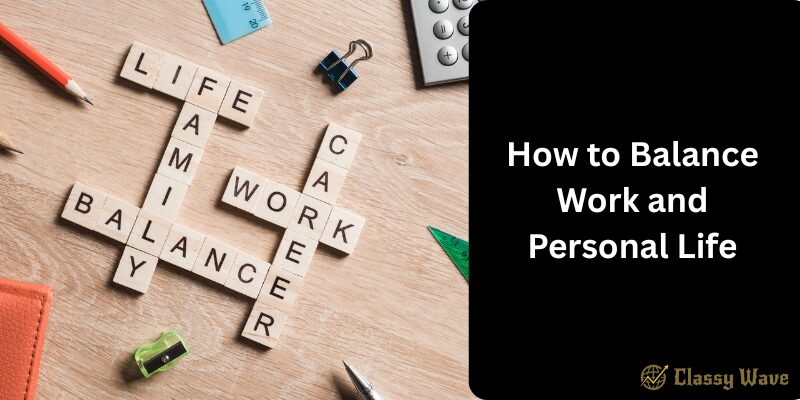How to Balance Work and Personal Life | Classy Wave
Finding balance between work and personal life can often feel like walking a tightrope. Between deadlines, meetings, family time, and personal goals, it’s easy to feel overwhelmed. But here’s the truth — balance doesn’t mean giving equal time to everything; it means creating harmony that helps you stay productive, fulfilled, and happy in both areas.
In today’s fast-paced world, learning how to balance work and personal life is essential not just for success but also for your well-being. Let’s explore practical strategies to help you achieve that balance.
1. Understand What Work-Life Balance Really Means
Work-life balance isn’t about splitting your time evenly between your job and personal life. It’s about prioritizing what matters most at a given time. Sometimes work will demand more attention, and other times, your personal life will take priority — and that’s completely okay.
It’s about feeling satisfied, not stretched too thin.
2. Set Clear Boundaries
Boundaries are your best friend when it comes to maintaining balance. Make it clear when your workday starts and ends. Avoid answering work emails or messages after office hours unless absolutely necessary.
Create physical boundaries too — if you work from home, set up a dedicated workspace. Once you leave that area, mentally “clock out” from work.
3. Learn to Prioritize Tasks
Not every task deserves your full attention or immediate action. Use the Eisenhower Matrix — divide tasks into four categories:
- Urgent and important
- Important but not urgent
- Urgent but not important
- Neither urgent nor important
Focus on the first two, delegate or reschedule the rest. This keeps you productive without burning out.
4. Use Your Time Wisely
Time management is key to balancing work and life. Start by planning your day the night before. Use tools like Google Calendar or Notion to organize your tasks.
Break your day into chunks — work, rest, family, and personal time. Sticking to a schedule helps prevent one area from consuming all your energy.
5. Don’t Be Afraid to Say No
Saying “no” isn’t selfish — it’s smart. Taking on too much work or too many personal commitments leads to exhaustion. Learn to protect your time by saying no to things that don’t align with your goals or values.
Remember, every time you say yes to something, you’re saying no to something else — make sure it’s worth it.
6. Take Regular Breaks
Breaks aren’t a luxury; they’re a necessity. Short breaks between work tasks improve focus and creativity. Go for a walk, stretch, or simply breathe deeply for a few minutes.
Following the Pomodoro Technique (25 minutes of work followed by a 5-minute break) can help you stay productive without feeling drained.
7. Make Time for Exercise and Health
Your physical and mental health directly affect how you manage your work and life. Regular exercise reduces stress, improves mood, and boosts energy. Even a 20-minute walk or a quick yoga session can make a big difference.
Don’t forget to eat healthy and get enough sleep — a tired mind can’t balance anything.
8. Disconnect from Technology
Technology helps us stay connected, but it also blurs the line between work and personal life. Set limits for screen time, especially before bed. Avoid checking emails during family dinners or scrolling endlessly on social media.
Try having at least one “tech-free hour” daily to recharge your mind.
9. Schedule Personal Time
Just as you schedule meetings, schedule personal time for hobbies, relaxation, or loved ones. Whether it’s reading a book, spending time with your kids, or enjoying a hobby — make it non-negotiable.
These moments fuel your happiness and make you more productive when you return to work.
10. Communicate Effectively
If you’re feeling overwhelmed, talk about it — whether with your manager, coworkers, or family. Open communication can help set realistic expectations. You don’t have to do everything alone; teamwork and support go a long way.
11. Delegate and Outsource
You don’t need to do everything yourself. At work, delegate tasks when possible. At home, consider sharing responsibilities or outsourcing chores like cleaning or grocery delivery.
Delegation isn’t a sign of weakness — it’s a sign of smart management.
12. Practice Mindfulness
Being present in the moment can dramatically improve your balance. Mindfulness helps you focus on what’s happening now instead of worrying about the next meeting or future task.
Try meditation, journaling, or even mindful breathing to clear your mind and stay centered.
13. Take Vacations and Time Off
Don’t let your paid leaves go unused. Taking time off allows your mind and body to rest, reset, and recharge. Even a weekend getaway or staycation can boost your motivation and creativity.
14. Create a Support System
Surround yourself with supportive people — friends, family, or mentors who understand your goals and challenges. Sharing your struggles can lighten your emotional load and give you a new perspective.
15. Reflect and Adjust Regularly
Balance isn’t a one-time achievement; it’s something you need to revisit often. Reflect on your week — did you spend enough time on your personal life? Are you overworking? Adjust as needed to stay aligned with your priorities.
Conclusion
Balancing work and personal life isn’t about perfection — it’s about creating harmony. Some days, work will take the spotlight; other days, your personal life will. What matters is finding a rhythm that supports your well-being and happiness.
With clear boundaries, smart time management, and regular self-care, you can enjoy a fulfilling life that blends both productivity and peace.







